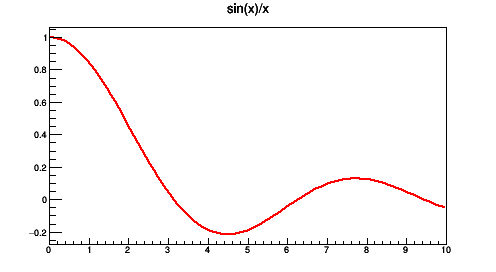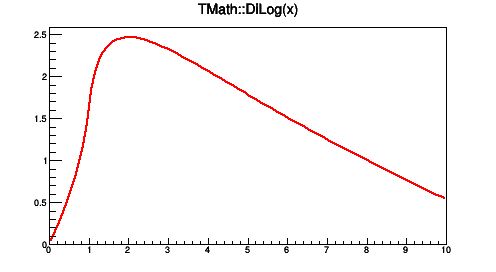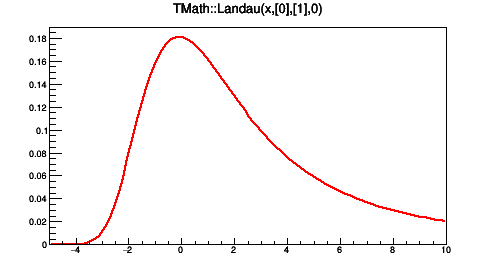class TF1Parameters
TF1: 1-Dim function class
The function may be a simple function (see TFormula) or a precompiled user function.
The function may have associated parameters.
TF1 graphics function is via the TH1/TGraph drawing functions.
The following types of functions can be created:
- A - Expression using variable x and no parameters
- B - Expression using variable x with parameters
- C - A general C function with parameters
- D - A general C++ function object (functor) with parameters
- E - A member function with parameters of a general C++ class
A - Expression using variable x and no parameters
Case 1: inline expression using standard C++ functions/operators
TF1 *fa1 = new TF1("fa1","sin(x)/x",0,10);
fa1->Draw();

Case 2: inline expression using TMath functions without parameters
TF1 *fa2 = new TF1("fa2","TMath::DiLog(x)",0,10);
fa2->Draw();

Case 3: inline expression using a CINT function by name
Double_t myFunc(x) {
return x+sin(x);
}
TF1 *fa3 = new TF1("fa3","myFunc(x)",-3,5);
fa3->Draw();
B - Expression using variable x with parameters
Case 1: inline expression using standard C++ functions/operators
- Example a:
> TF1 *fa = new TF1("fa","[0]*x*sin([1]*x)",-3,3);This creates a function of variable x with 2 parameters. The parameters must be initialized via:
fa->SetParameter(0,value_first_parameter); fa->SetParameter(1,value_second_parameter);
Parameters may be given a name:fa->SetParName(0,"Constant");
- Example b:
> TF1 *fb = new TF1("fb","gaus(0)*expo(3)",0,10);gaus(0) is a substitute for [0]*exp(-0.5*((x-[1])/[2])**2) and (0) means start numbering parameters at 0. expo(3) is a substitute for exp([3]+[4]*x).
Case 2: inline expression using TMath functions with parameters
>
TF1 *fb2 = new TF1("fa3","TMath::Landau(x,[0],[1],0)",-5,10);
fb2->SetParameters(0.2,1.3);
fb2->Draw();

C - A general C function with parameters
Consider the macro myfunc.C below:
// Macro myfunc.C
Double_t myfunction(Double_t *x, Double_t *par)
{
Float_t xx =x[0];
Double_t f = TMath::Abs(par[0]*sin(par[1]*xx)/xx);
return f;
}
void myfunc()
{
TF1 *f1 = new TF1("myfunc",myfunction,0,10,2);
f1->SetParameters(2,1);
f1->SetParNames("constant","coefficient");
f1->Draw();
}
void myfit()
{
TH1F *h1=new TH1F("h1","test",100,0,10);
h1->FillRandom("myfunc",20000);
TF1 *f1=gROOT->GetFunction("myfunc");
f1->SetParameters(800,1);
h1->Fit("myfunc");
}
In an interactive session you can do:
Root > .L myfunc.C Root > myfunc(); Root > myfit();
TF1 objects can reference other TF1 objects (thanks John Odonnell) of type A or B defined above. This excludes CINT interpreted functions and compiled functions. However, there is a restriction. A function cannot reference a basic function if the basic function is a polynomial polN.
Example:
{
TF1 *fcos = new TF1 ("fcos", "[0]*cos(x)", 0., 10.);
fcos->SetParNames( "cos");
fcos->SetParameter( 0, 1.1);
TF1 *fsin = new TF1 ("fsin", "[0]*sin(x)", 0., 10.);
fsin->SetParNames( "sin");
fsin->SetParameter( 0, 2.1);
TF1 *fsincos = new TF1 ("fsc", "fcos+fsin");
TF1 *fs2 = new TF1 ("fs2", "fsc+fsc");
}
D - A general C++ function object (functor) with parameters
A TF1 can be created from any C++ class implementing the operator()(double *x, double *p). The advantage of the function object is that he can have a state and reference therefore what-ever other object. In this way the user can customize his function.Example:
class MyFunctionObject {
public:
// use constructor to customize your function object
double operator() (double *x, double *p) {
// function implementation using class data members
}
};
{
....
MyFunctionObject * fobj = new MyFunctionObject(....); // create the function object
TF1 * f = new TF1("f",fobj,0,1,npar,"MyFunctionObject"); // create TF1 class.
.....
}
E - A member function with parameters of a general C++ class
A TF1 can be created in this case from any member function of a class which has the signature of (double * , double *) and returning a double.Example:
class MyFunction {
public:
...
double Evaluate() (double *x, double *p) {
// function implementation
}
};
{
....
MyFunction * fptr = new MyFunction(....); // create the user function class
TF1 * f = new TF1("f",fptr,&MyFunction::Evaluate,0,1,npar,"MyFunction","Evaluate"); // create TF1 class.
.....
}
Function Members (Methods)
public:
| virtual | ~TF1Parameters() |
| static TClass* | Class() |
| Double_t | GetParameter(Int_t iparam) const |
| Double_t | GetParameter(const char* name) const |
| const Double_t* | GetParameters() const |
| const char* | GetParName(Int_t iparam) const |
| Int_t | GetParNumber(const char* name) const |
| virtual TClass* | IsA() const |
| TF1Parameters& | operator=(const TF1Parameters& rhs) |
| const vector<double>& | ParamsVec() const |
| void | SetParameter(Int_t iparam, Double_t value) |
| void | SetParameter(const char* name, Double_t value) |
| void | SetParameters(const Double_t* params) |
| void | SetParameters(Double_t p0, Double_t p1, Double_t p2 = 0, Double_t p3 = 0, Double_t p4 = 0, Double_t p5 = 0, Double_t p6 = 0, Double_t p7 = 0, Double_t p8 = 0, Double_t p9 = 0, Double_t p10 = 0) |
| void | SetParName(Int_t iparam, const char* name) |
| void | SetParNames(const char* name0 = "p0", const char* name1 = "p1", const char* name2 = "p2", const char* name3 = "p3", const char* name4 = "p4", const char* name5 = "p5", const char* name6 = "p6", const char* name7 = "p7", const char* name8 = "p8", const char* name9 = "p9", const char* name10 = "p10") |
| virtual void | ShowMembers(TMemberInspector& insp) const |
| virtual void | Streamer(TBuffer&) |
| void | StreamerNVirtual(TBuffer& ClassDef_StreamerNVirtual_b) |
| TF1Parameters() | |
| TF1Parameters(Int_t npar) | |
| TF1Parameters(const TF1Parameters& rhs) |
private:
| bool | CheckIndex(Int_t i) const |
Data Members
private:
| vector<string> | fParNames | parameter names |
| vector<Double_t> | fParameters | parameter values |
Class Charts

Function documentation
Int_t GetParNumber(const char* name) const
return the parameter number given a name not very efficient but list of parameters is typically small could use a map if needed
void SetParameters(Double_t p0, Double_t p1, Double_t p2 = 0, Double_t p3 = 0, Double_t p4 = 0, Double_t p5 = 0, Double_t p6 = 0, Double_t p7 = 0, Double_t p8 = 0, Double_t p9 = 0, Double_t p10 = 0)
set parameter values
void SetParNames(const char* name0 = "p0", const char* name1 = "p1", const char* name2 = "p2", const char* name3 = "p3", const char* name4 = "p4", const char* name5 = "p5", const char* name6 = "p6", const char* name7 = "p7", const char* name8 = "p8", const char* name9 = "p9", const char* name10 = "p10")
set parameter names
TF1Parameters(Int_t npar)
Double_t GetParameter(const char* name) const
const Double_t * GetParameters() const
const char * GetParName(Int_t iparam) const
void SetParameters(const Double_t* params)
void SetParameter(const char* name, Double_t value)
void SetParName(Int_t iparam, const char* name)
bool CheckIndex(Int_t i) const